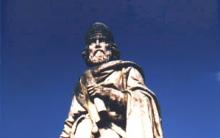At the turn of the 18th and 19th centuries, a romantic tradition developed in Russia, replacing classicism. If the previous literary movement focused on the development of society and sought to describe the ideal world order, then for romanticism something completely different becomes important. In the works of the romantics, man, his inner world, aspirations and feelings come first. Romantic writers firmly believe that every person is unique and of primary value, so they shift their attention to the depiction of feelings and experiences. This is how a romantic hero appears, for whose portrayal quite clear literary canons are soon formed.
The first rule of romanticism as a literary movement is the depiction of an unusual hero in unusual conditions. As a rule, romantic writers choose an atypical setting for their works: a forest, mountains, desert, or some ancient castle. An unusual hero is placed in a mysterious place, possessing all the best human qualities: he is handsome, proud and noble. He is better than the people around him and at the same time arouses their hostility. From here follows the second condition: the opposition of the hero and society, the hero and the surrounding reality. The romantic hero is always in opposition, since he clearly sees the imperfection of the world and, due to his moral purity, does not want to come to terms with it. This is what the romantic conflict is built on. Another prerequisite for the literature of romanticism is a detailed description of the hero’s thoughts. For this, the form of a diary, lyrical monologue or confession is chosen.
A classic example of a romantic hero in the works of Russian writers can be the heroes of the works of M. Lermontov. These are Pechorin and Arbenin, Demon and Mtsyri... Let's consider Mtsyri as a romantic hero.
Mtsyri as a romantic hero
In his works, Lermontov took into account the creative experience of Byron, who was his idol for many years, which is why we can talk about Lermontov’s heroes as Byronic heroes. The Byronic hero is a romantic hero of the highest quality, a rebel hero with a fiery nature. No circumstances can break him. These qualities especially attracted Lermontov, and it is them that he writes out in his heroes with special care. Such is the romantic hero Mtsyri, who can be called the ideal of a romantic hero.
We learn about Mtsyri’s life, or rather about its key moments, first-hand, since Lermontov chose the form of confession for the poem. This is one of the most popular genres of romanticism, since confession allows you to open the depths of the human soul, making the story both emotional and sincere. The hero is placed in an unusual place: in a monastery in the Caucasus, and the Caucasus for Russian people then seemed like a very exotic land, a center of freedom and free-thinking. The features of the romantic hero of “Mtsyri” can already be seen in how little the reader is told about the hero’s previous life - just a few meager phrases about his childhood. His life in the monastery is shrouded in mystery, so characteristic of romantic works. As a little boy, Mtsyri was captured by a Russian general and brought to the monastery, where he grew up - that’s what the reader knows. But Mtsyri himself is not an ordinary monk, he has a completely different character, he is a rebel by nature. He was never able to forget his homeland and abandon it; he longs for real life and is ready to pay any price for it.
Was it easy for Mtsyri to decide to escape from the quiet existence in his cell? It is obvious that the monks who cured and raised Mtsyri did not wish him harm. But their world cannot become Mtsyri, since it was created for another life. And in her name he is ready to take risks. In accordance with the romantic tradition, life in the monastery and life outside it are contrasted here, with the first symbolizing the lack of freedom and constraint of the human personality, while the second is an ideal life. It is precisely this that Mtsyri, born for freedom, strives for. His escape is a rebellion against tradition; it is significant that it takes place on a stormy, stormy night, when monks are supposed to pray, fearing the “wrath of God.” For Mtsyri, the thunderstorm evokes delight, a desire to become related to the rebellious elements: “I’m like a brother...”. The hero's sincerity overcomes his ostentatious monastic humility - Mtsyri finds himself free.
Tragedy of Mtsyri
The romantic hero is almost always doomed to defeat in the fight against the world, since this fight is unequal. His dreams, as a rule, do not come true, and his life ends early. In this, the romantic hero of Lermontov’s poem “Mtsyri” turns out to be an exception: he still managed to fulfill part of his dream and breathe in the air of freedom. Another thing is that, as the epigraph to the poem tells us, he “tasted little honey,” and freedom was given to him for only three days - but the more vividly they will experience this time. Mtsyri is happy with his merging with nature. Here, memories of his family, his native village and a happy childhood come back to him. Here his blood awakens, the blood of the warlike highlanders, and he turns out to be capable of feats. During the battle with the leopard, Mtsyri appears before the reader as a brave warrior, fully aware of his strength and able to use it. He is beautiful, just like the wild nature around him: he is part of it and its child.
But Lermontov could not rightfully be called a great romantic poet if he had turned his poem into a happy fairy tale. Mtsyri is defeated by circumstances, he is wounded and again brought to his cell. Freedom only beckoned him, but his main dream: to return to his homeland, to the distant, free Caucasus, did not come true. And, if you think about it, it was not feasible at all, because no one was waiting for him there. Mtsyri’s loved ones were long dead, the house was destroyed, and in his own home he would have turned out to be exactly the same stranger as in the monastery. This is where true romantic tragedy manifests itself: the hero is completely excluded from this world and is equally alien to everyone in it. Happiness may await him only beyond the limits of life, but Mtsyri does not want to give up. He would willingly exchange “Paradise and Eternity” for a few minutes at home. He dies unbroken and his last gaze is turned to the Caucasus.
The image of Mtsyri is the image of a romantic hero with a deeply tragic story, who rightfully enjoys the love of many generations of readers. “...You see what a fiery soul, what a mighty spirit, what a gigantic nature this Mtsyri has!” - this is how the critic Belinsky spoke about him, and the critic’s words really fully characterize the hero. Years go by, literary trends change, the romantic tradition is a thing of the past, but the image of Mtsyri still inspires heroic deeds and awakens love for what is most valuable: life and homeland.
The given image of the romantic hero of the poem and a description of his features will be useful to 8th grade students when searching for materials for an essay on the topic “Mtsyri as a romantic hero of Lermontov’s poem”
Work test
Mikhail Yuryevich Lermontov, a famous Russian poet, is one of the most prominent representatives of the romanticism movement in literature. His works are often dedicated to feelings of despair and spiritual bondage, which are caused by the severity of earthly life and the inability to live freely.
Lermontov was always attracted by the power of the elements of the human spirit and the desire to remain oneself, despite circumstances and trials. The romantic poem "Mtsyri" is also devoted to this topic. The poet gives the romantic image of the main character that burning despair and that thirst for free will and life, which gives the poem an atmosphere of gloomy despair and hopelessness.
The image of Mtsyri in the poem
Mtsyri's life is hard and unbearable - he is imprisoned in a monastery, and desperately longs to return to his homeland and enjoy its open spaces and fresh air. He endures being in captivity extremely hard, and decides to escape, despite the fact that this could lead to his death.
The mental anguish is unbearable, and Mtsyri understands that it is better to die than to live like this further. Lermontov raises the theme of the Caucasus, which is characteristic of Russian literature of that period. The wild and beautiful nature of this region corresponds to the people who live in it - they are freedom-loving people, strong and brave.
This is how Mtsyri is presented, who values, first of all, his freedom and his ideals, and does not resign himself to reality. And the majestic and impressive nature of the Caucasus emphasizes the romantic mood of the poem and the character traits of the main character Mtsyri.
Contrasting dreams and reality
The description of nature speaks of a romantic ideal and the desire to become spiritually richer, of the passion that exists in the human soul and which leads the hero into a world that seems ideal and real to him. The hero Mtsyri himself represents a contrast to the whole world, so he is not like other people; real ardent feelings live in his soul, which imprisonment does not allow him to endure.
He strives to experience something exceptional, and is ready to see it in the world around him. He is lonely in his soul, because he feels isolated from other people. Mtsyri is the concentration of will, courage and true passion. Lermontov created his hero this way because he wanted to emphasize the contrast between dreams and reality.
His hero escapes from the monastery, and after going through many trials, he never reaches his home. He dies, but it is important exactly how Mtsyri passes away - happy and peaceful. Mtsyri thanks fate for those wonderful moments that she gave him in nature, and understands that for the sake of these moments it was worth taking the risk - leaving the monastery and meeting death with dignity.
The tragic end of the poem- this is a triumph of the inner freedom of the protagonist, who, despite death and obstacles, feels truly happy. His desire for freedom is the main lesson that Lermontov wants to teach his readers; the poet points out that it is for this that it is worth living and overcoming difficulties.
This internal landmark of Mtsyri is a symbol of the meaning of human life. And his rebellious nature, which is revealed in longing for his homeland, suggests that in life it is worth looking for something exceptional and unusual, and something that will fill human existence with true spiritual feelings.
Lermontov's essay
Plan
1.Romantic images of Lermontov.
2. Mtsyri as a romantic hero
2.1. The hero's past.
2.2. Life in captivity.
2.3. The desire for freedom.
3. The tragedy of Mtsyri.
M. Yu. Lermontov is a wonderful writer and poet who created many vivid romantic images. This is the bored traveler Pechorin, the jealous avenger Arbenin, and the freedom-loving rebel Mtsyri. These heroes, so different from each other, are close in one thing - they are in constant search, they love freedom, they fight for their ideas.
Mtsyri is the main character of the poem of the same name. Like all romantic heroes, he is a little dreamy and enthusiastic. But at the same time, Mtsyri is the son of highlanders. As a child, he was captured by a Russian general after a battle. During the difficult journey, the boy fell ill and was left in the care of the monks. They came out to Mtsyri and raised him as a Christian. The child forgot his language and his culture, they began to forcibly prepare him for tonsure.
For the young man, the monastery began to be identified with a prison. He understands that his past and present have been taken away from him, that decisions are made for him, that he is not free in his choice. At night, the young man dreams of foggy pictures from his past life. He wants to break free, he longs to see the life hidden by the walls of the monastery. And Mtsyri decides to escape.
The monks searched for the fugitive for several days, and finally found him half-dead in a clearing. The young man is taken to his cell, where he confesses before his death. Mtsyri tells how wonderful it was for him to breathe in freedom. Seeing his native expanses, he finally remembered his family and his language, his father and brothers with weapons in their hands. The young man feels nature very subtly and admires its beauty. For him, living means enjoying every blade of grass, every glare of the sun. Here, in freedom, a young man for the first time experiences romantic feelings for a Georgian girl whom he accidentally meets by a water stream. His heart draws him to her, but he restrains his impulses and sets out in search of his home.
Although Mtsyri is a romantic hero, first of all he is a freedom-loving patriot. Love for his native village and for a beautiful girl are inseparable for him, the thirst for freedom and personal happiness merges into the only desire of his heart. The young man is strong and brave, he fearlessly enters into battle with a wild animal and wins, despite exhaustion and bloody wounds. The hero is absorbed in one thought - to find freedom, to find his home. But these aspirations are not destined to come true.
The young man again sees the walls of the hated monastery! Mtsyri understands that he will end up in prison again. Like all romantic heroes, the young man is alone in his grief, he is an extra person. His hopes of finding happiness in his native village are impossible even because no one is waiting for him there. Mtsyri’s relatives died, and for his fellow villagers he will seem alien, not like everyone else. Before his death, the young man asks to be buried outside the walls of the monastery, in freedom, and regrets that he only managed to feel happy for one moment. This is the whole tragedy of the romantic image of Mtsyri. His unbridled desire for love and freedom is shattered by the realities of a cruel world. Having taken a breath of the clean air of independence, he again becomes a slave and dies behind bars.
At the turn of the 18th and 19th centuries, a romantic tradition developed in Russia, replacing classicism. If the previous literary movement focused on the development of society and sought to describe the ideal world order, then for romanticism something completely different becomes important. In the works of the romantics, man, his inner world, aspirations and feelings come first. Romantic writers firmly believe that every person is unique and of primary value, so they shift their attention to the depiction of feelings and experiences. This is how a romantic hero appears, for whose portrayal quite clear literary canons are soon formed.
The first rule of romanticism as a literary movement is the depiction of an unusual hero in unusual conditions. As a rule, romantic writers choose an atypical setting for their works: a forest, mountains, desert, or some ancient castle. An unusual hero is placed in a mysterious place, possessing all the best human qualities: he is handsome, proud and noble. He is better than the people around him and at the same time arouses their hostility. From here follows the second condition: the opposition of the hero and society, the hero and the surrounding reality. The romantic hero is always in opposition, since he clearly sees the imperfection of the world and, due to his moral purity, does not want to come to terms with it. This is what the romantic conflict is built on. Another prerequisite for the literature of romanticism is a detailed description of the hero’s thoughts. For this, the form of a diary, lyrical monologue or confession is chosen.
A classic example of a romantic hero in the works of Russian writers can be the heroes of the works of M. Lermontov. These are Pechorin and Arbenin, Demon and Mtsyri... Let's consider Mtsyri as a romantic hero.
Mtsyri as a romantic hero
In his works, Lermontov took into account the creative experience of Byron, who was his idol for many years, which is why we can talk about Lermontov’s heroes as Byronic heroes. The Byronic hero is a romantic hero of the highest quality, a rebel hero with a fiery nature. No circumstances can break him. These qualities especially attracted Lermontov, and it is them that he writes out in his heroes with special care. Such is the romantic hero Mtsyri, who can be called the ideal of a romantic hero.
We learn about Mtsyri’s life, or rather about its key moments, first-hand, since Lermontov chose the form of confession for the poem. This is one of the most popular genres of romanticism, since confession allows you to open the depths of the human soul, making the story both emotional and sincere. The hero is placed in an unusual place: in a monastery in the Caucasus, and the Caucasus for Russian people then seemed like a very exotic land, a center of freedom and free-thinking. The features of the romantic hero of “Mtsyri” can already be seen in how little the reader is told about the hero’s previous life - just a few meager phrases about his childhood. His life in the monastery is shrouded in mystery, so characteristic of romantic works. As a little boy, Mtsyri was captured by a Russian general and brought to the monastery, where he grew up - that’s what the reader knows. But Mtsyri himself is not an ordinary monk, he has a completely different character, he is a rebel by nature. He was never able to forget his homeland and abandon it; he longs for real life and is ready to pay any price for it.
Was it easy for Mtsyri to decide to escape from the quiet existence in his cell? It is obvious that the monks who cured and raised Mtsyri did not wish him harm. But their world cannot become Mtsyri, since it was created for another life. And in her name he is ready to take risks. In accordance with the romantic tradition, life in the monastery and life outside it are contrasted here, with the first symbolizing the lack of freedom and constraint of the human personality, while the second is an ideal life. It is precisely this that Mtsyri, born for freedom, strives for. His escape is a rebellion against tradition; it is significant that it takes place on a stormy, stormy night, when monks are supposed to pray, fearing the “wrath of God.” For Mtsyri, the thunderstorm evokes delight, a desire to become related to the rebellious elements: “I’m like a brother...”. The hero's sincerity overcomes his ostentatious monastic humility - Mtsyri finds himself free.
Tragedy of Mtsyri
The romantic hero is almost always doomed to defeat in the fight against the world, since this fight is unequal. His dreams, as a rule, do not come true, and his life ends early. In this, the romantic hero of Lermontov’s poem “Mtsyri” turns out to be an exception: he still managed to fulfill part of his dream and breathe in the air of freedom. Another thing is that, as the epigraph to the poem tells us, he “tasted little honey,” and freedom was given to him for only three days - but the more vividly they will experience this time. Mtsyri is happy with his merging with nature. Here, memories of his family, his native village and a happy childhood come back to him. Here his blood awakens, the blood of the warlike highlanders, and he turns out to be capable of feats. During the battle with the leopard, Mtsyri appears before the reader as a brave warrior, fully aware of his strength and able to use it. He is beautiful, just like the wild nature around him: he is part of it and its child.
But Lermontov could not rightfully be called a great romantic poet if he had turned his poem into a happy fairy tale. Mtsyri is defeated by circumstances, he is wounded and again brought to his cell. Freedom only beckoned him, but his main dream: to return to his homeland, to the distant, free Caucasus, did not come true. And, if you think about it, it was not feasible at all, because no one was waiting for him there. Mtsyri’s loved ones were long dead, the house was destroyed, and in his own home he would have turned out to be exactly the same stranger as in the monastery. This is where true romantic tragedy manifests itself: the hero is completely excluded from this world and is equally alien to everyone in it. Happiness may await him only beyond the limits of life, but Mtsyri does not want to give up. He would willingly exchange “Paradise and Eternity” for a few minutes at home. He dies unbroken and his last gaze is turned to the Caucasus.
The image of Mtsyri is the image of a romantic hero with a deeply tragic story, who rightfully enjoys the love of many generations of readers. “...You see what a fiery soul, what a mighty spirit, what a gigantic nature this Mtsyri has!” - this is how the critic Belinsky spoke about him, and the critic’s words really fully characterize the hero. Years go by, literary trends change, the romantic tradition is a thing of the past, but the image of Mtsyri still inspires heroic deeds and awakens love for what is most valuable: life and homeland.
The given image of the romantic hero of the poem and a description of his features will be useful to 8th grade students when searching for materials for an essay on the topic “Mtsyri as a romantic hero of Lermontov’s poem”
Work test
An important stage of learning is a form of knowledge testing such as an essay. "Mtsyri" is the romantic hero of Lermontov's poem. Mikhail Yuryevich created an unusual character with a tragic fate, who endlessly finds himself in an unusual environment for him. The name of the main character also hints at this. After all, this word is translated from Georgian as “monk, novice” or “stranger, foreigner.”
Let's consider a possible version of the school work "Essay on the poem" Mtsyri ". As it appears to the reader from the first lines.
The main idea of the story
Lermontov portrayed a very strong-willed man who, for the sake of his ideals and goals, is ready to sacrifice everything, even his life.
The main idea of the work is protest and courage. The love motive is almost completely absent; it is reflected only in the short meeting of the hero with a Georgian woman near a mountain stream.
Not only the main character strongly attracts the reader's attention, but also the plot of the story itself.
When Mtsyri was still a child, the Russian general sent him to a Georgian monastery to be raised. Nothing is known about the boy’s relatives, and he himself was taken as a prisoner. The main character could not withstand such a blow of fate, because he was left an orphan in a place completely foreign to him. Because of this, the disease began to slowly kill him. Mtsyri was approaching death faster and faster. But he was lucky: one monk who became attached to him saved the boy. The young man grew up, learned the language and was preparing to be tonsured. “Mtsyri as a romantic hero” is an essay about a real person.
Escape in a thunderstorm
But suddenly a fatal event happens: on the eve of tonsure, Mtsyri arranges an escape. This night was terrible, a thunderstorm raged with might and main. The actions of the main character and the weather even complement each other. Of course, they begin to look for the hero. The search lasted three whole days, but everything was in vain. In the end, he is found unconscious, and the same illness that struck him in childhood begins to destroy him again. An essay on the topic “Mtsyri as a romantic hero” should colorfully reflect this moment. The monk who raised him is again trying to save the main character from the clutches of death. Mtsyri confesses to him, his confession is filled with notes of pride and passion. It reveals the character of the main character.

Life in the monastery
“Mtsyri as a romantic hero” is an essay about involuntary imprisonment.Of course, the most important point remains the question of Mtsyri’s escape. Why did he do this? What are the reasons? We should not forget that our hero spent his life in this monastery not of his own free will. He became a prisoner, and the monastery became a prison. Such a life was not a life for him at all. In his opinion, it is better to die in freedom than to live in captivity all the time. How much the hero was deprived of! Mother's lullabies, games with peers. He was never a monk at heart; evil fate forced him to be one. That's why he dreamed of getting, at least for a short moment, everything that he had lost.

Mtsyri knew that he was taking a very big risk, because he had no one and nothing in that unknown world. But that didn't stop him. The hero wasted no time when he finally got what he wanted for so long. He looks with complete delight at the world he was deprived of. And only here we see the real Mtsyri. His gloom and silence disappear somewhere, and we see that the hero of the poem is not only a rebel, but also a romantic. These character traits were revealed against the backdrop of the beautiful Caucasian nature.
Mtsyri as a romantic hero: an essay on fortitude
He is shown to be courageous and brave, he feels like a warrior, even though he never had the opportunity to experience battles and battles. A very important moment in the story are the tears of the main character. He was very proud of the fact that he usually did not give them free rein. But when escaping, Mtsyri could not restrain himself, even though no one saw him. The hero even compared himself to a thunderstorm. While the monks cowardly hid from her, he decided to escape. It was as if he had become part of this stormy night.
Fortitude and patriotism
The young man’s courage and perseverance is manifested not only in the escape itself, not only in the fact that he decided to take such a risk, but also, for example, in the episode of the battle with the leopard. To analyze the main plot of the poem, you can write an essay “Mtsyri as a romantic hero.” Briefly the author expresses his attitude towards important things in life. He was not afraid of death, because returning to the monastery, returning to his captivity were much more terrible for him. The tragic ending only emphasizes the strength of spirit, patriotism and love for the will of the protagonist. And maybe he couldn't defeat fate. He was able to change it only for a short moment. But all this did not break the hero’s inner world.

Mtsyri is a deep patriot, because his main goal after escaping is the road to his homeland. Yes, he understands that no one is waiting for him there, but that’s not the main thing. It is important for him to at least just set foot on his native soil.
Meeting
The steadfastness and strength of Mtsyri’s patriotism is also proven by the episode of his meeting with a girl. He felt the birth of his first love, he had only to follow the girl. But the desire to get to the Motherland turns out to be stronger. Despite everything, he continues to move forward.
The role of landscape
The image of Mtsyri is perfectly revealed not only by its internal qualities, but also by the surrounding landscape. Mtsyri is a romantic hero, so he completely and completely feels unity with nature. He identifies himself either with a thunderstorm or with a small leaf. Either he, like flowers at sunrise, raises his head, then he learns the secrets of birds, listening to their chirping. He understands every pebble, every twig and blade of grass, notices all the shades of nature. He feels like an extension of her.
But nature is very strong and dangerous. Despite his unity with her, she also becomes an obstacle. That dark forest in which the hero got lost. He didn’t give up until the very end, but he was so desperate when the whole truth reached Mtsyri - he walked in circles.
Nature gave Mtsyri almost everything he desired: a sense of freedom, a sense of life. But the hero is not allowed to achieve the main goal, since he is not able to overcome the weakness of the body.

Traditional features of romanticism in the poem
The poem by Mikhail Yuryevich Lermontov is undoubtedly filled with the traditions of romanticism, which is proved by the main one as a romantic hero" - an essay on the school curriculum that reveals the character. He is full of passions, lonely, united with nature, and not with the environment. He gradually and completely opens his soul. All these are signs of romanticism.
The form of confession is also characteristic of poems in the Romantic style. After all, we read the hero’s soul through his own experiences, they are very detailed, which only helps to penetrate him deeper. In addition, the confession contains many metaphors and images. An essay on the topic “Mtsyri as a romantic hero” should reflect the fact that the hero’s childhood was unhappy. Thanks to this, we understand our hero and his inner world more deeply.

Lermontov is proud of his character. After all, slavery makes people weak and kills their willpower. Fortunately, this did not happen to Mtsyri. His character is a counterbalance to the modern society in which the author himself lived. The hero of the poem reflects the struggle and strength, but unfortunately there are too few of them to defeat society.When the hero's strength leaves him, he does not betray himself. His death is also a protest. Finally he gets what he wanted - freedom. His soul will undoubtedly return to his homeland.
Mtsyri will forever remain a symbol of unbending will, courage and perseverance, which will help a person achieve his goals, no matter what. An essay on literature “Mtsyri - a romantic hero” is part of the school curriculum in high school.











Annexation of the Crimean Khanate to Russia Abolition of duties and the mint
Church of St. Dmitry the Myrrh-Streaming in the field
Group Bible Reading and Study Time of Voluntary Infirmity
Meat with eggplants and tomatoes in the oven Ragu with white wine
How to properly and tasty cook pancakes with cottage cheese